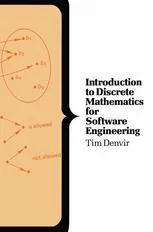Introduction to Discrete Mathematics for Software Engineering
4.8
Reviews from our users

You Can Ask your questions from this book's AI after Login
Each download or ask from book AI costs 2 points. To earn more free points, please visit the Points Guide Page and complete some valuable actions.Introduction to Discrete Mathematics for Software Engineering
Welcome to Introduction to Discrete Mathematics for Software Engineering, a comprehensive guide designed to bridge the gap between the theoretical foundations of mathematics and its practical applications in modern software engineering. This book lays the groundwork for understanding the essential principles that underpin computational processes, algorithms, and software development, empowering software professionals and students to make informed, logical, and efficient decisions when crafting their solutions.
Whether you're a student embarking on your journey in software development or a seasoned engineer seeking to deepen your knowledge of discrete mathematics, this book offers practical insight into the tools and techniques you will rely on in your professional life. It demystifies the mathematical concepts that software engineers frequently encounter, illustrating how these frameworks can be applied to real-world problems.
Detailed Summary of the Book
The book combines theoretical depth with practical examples, ensuring that readers acquire not only the "what" but also the "why" and "how" of discrete mathematics.
The book starts with the basics of sets, logic, and functions—concepts that form the backbone of computer science. Readers are introduced to propositional and predicate logic, essential tools for reasoning about programs and specifications. The next section covers relations and their importance in structuring data, databases, and algorithms. Moving forward, the book delves into graph theory and trees, topics crucial for designing efficient algorithms, understanding networks, and modeling relationships.
Combinatorics, probability, and recurrence relations are explored in subsequent chapters, giving readers the skills to analyze algorithm performance while modeling computational problems. These sections are especially valuable for understanding randomized algorithms and solving optimization problems. The final chapters cover Boolean algebra, finite automata, and formal languages, which are imperative for circuit design, compiler construction, and software verification.
By integrating core concepts with carefully curated examples, exercises, and problem-solving strategies, the text helps readers cultivate a problem-solving mindset that is essential for dealing with the complexities of software engineering.
Key Takeaways
- An in-depth understanding of foundational discrete math topics such as set theory, logic, graph theory, and combinatorics.
- The ability to apply mathematical reasoning to solve software engineering challenges.
- Practical techniques for algorithm design, analysis, and optimization using mathematical principles.
- Insights into the connection between formal methods and program correctness.
- A solid introduction to mathematical structures used for computer science applications, including Boolean algebra, finite automata, and formal languages.
- Problem-solving exercises to reinforce understanding and encourage independent critical thinking.
Famous Quotes from the Book
“Mathematics is not just a set of tools; it is a way of thinking, a way of seeing patterns in the cosmos of computation.”
“To write efficient software, one must first understand how the universe of algorithms is built upon the solid bedrock of mathematical reason.”
“Formal languages and automata are the architects’ blueprints of software. Ignore them at your peril.”
Why This Book Matters
Discrete mathematics forms the backbone of computer science and software engineering. It provides the theoretical framework required to analyze problems logically, design efficient algorithms, and create robust software systems. Without a firm grasp of these concepts, software engineers risk building solutions without a foundational understanding of their limitations, performance, and correctness.
This book matters because it bridges theory with practice. It demystifies the intimidating world of mathematics, making it accessible and relevant to modern software engineers. With a blend of practical examples, rigorous theoretical explanations, and problem-solving exercises, this book equips readers with the critical skills they need to excel in a competitive and rapidly evolving field.
Moreover, Introduction to Discrete Mathematics for Software Engineering serves as a reliable companion for anyone seeking to master the logical and mathematical underpinnings of their craft. It provides a structured approach to learning that integrates seamlessly into academic curricula while also offering value to practitioners looking to refresh their skills or explore new domains.
By the time you finish this book, you will not only understand the "what" and "how" of discrete mathematics, but also why it is critical for your success in the field of software engineering. This knowledge will enable you to write more robust, efficient, and maintainable software, with a deeper appreciation for the mathematical principles that underpin the digital world.
Free Direct Download
Get Free Access to Download this and other Thousands of Books (Join Now)
For read this book you need PDF Reader Software like Foxit Reader


